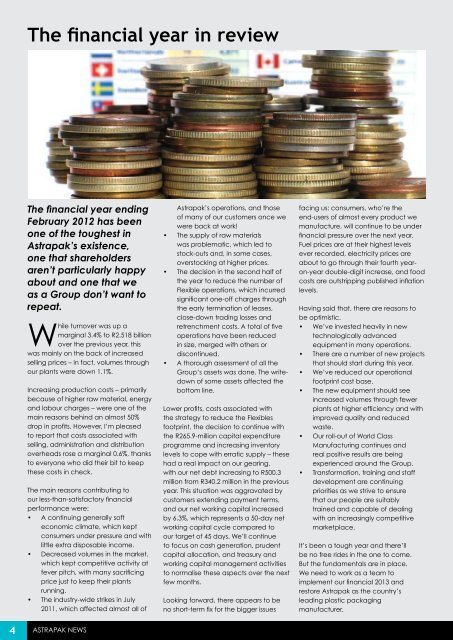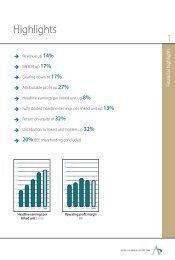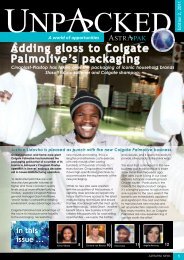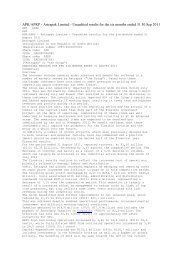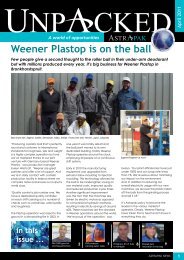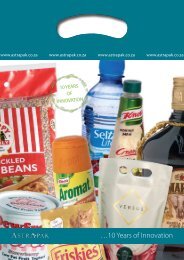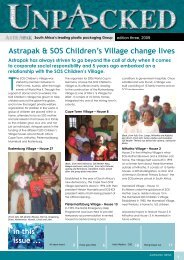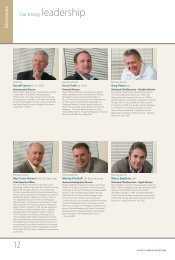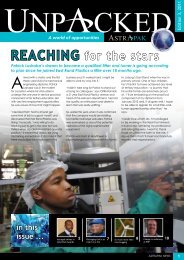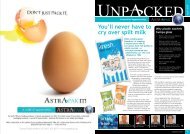'Sawubona' to Sandile
'Sawubona' to Sandile
'Sawubona' to Sandile
Create successful ePaper yourself
Turn your PDF publications into a flip-book with our unique Google optimized e-Paper software.
The financial year in review<br />
The financial year ending<br />
February 2012 has been<br />
one of the <strong>to</strong>ughest in<br />
Astrapak’s existence,<br />
one that shareholders<br />
aren’t particularly happy<br />
about and one that we<br />
as a Group don’t want <strong>to</strong><br />
repeat.<br />
While turnover was up a<br />
marginal 3.4% <strong>to</strong> R2.518 billion<br />
over the previous year, this<br />
was mainly on the back of increased<br />
selling prices – in fact, volumes through<br />
our plants were down 1.1%.<br />
Increasing production costs – primarily<br />
because of higher raw material, energy<br />
and labour charges – were one of the<br />
main reasons behind an almost 50%<br />
drop in profits. However, I’m pleased<br />
<strong>to</strong> report that costs associated with<br />
selling, administration and distribution<br />
overheads rose a marginal 0.6%, thanks<br />
<strong>to</strong> everyone who did their bit <strong>to</strong> keep<br />
these costs in check.<br />
The main reasons contributing <strong>to</strong><br />
our less-than-satisfac<strong>to</strong>ry financial<br />
performance were:<br />
• A continuing generally soft<br />
economic climate, which kept<br />
consumers under pressure and with<br />
little extra disposable income.<br />
• Decreased volumes in the market,<br />
which kept competitive activity at<br />
fever pitch, with many sacrificing<br />
price just <strong>to</strong> keep their plants<br />
running.<br />
• The industry-wide strikes in July<br />
2011, which affected almost all of<br />
Astrapak’s operations, and those<br />
of many of our cus<strong>to</strong>mers once we<br />
were back at work!<br />
• The supply of raw materials<br />
was problematic, which led <strong>to</strong><br />
s<strong>to</strong>ck-outs and, in some cases,<br />
overs<strong>to</strong>cking at higher prices.<br />
• The decision in the second half of<br />
the year <strong>to</strong> reduce the number of<br />
Flexible operations, which incurred<br />
significant one-off charges through<br />
the early termination of leases,<br />
close-down trading losses and<br />
retrenchment costs. A <strong>to</strong>tal of five<br />
operations have been reduced<br />
in size, merged with others or<br />
discontinued.<br />
• A thorough assessment of all the<br />
Group’s assets was done. The writedown<br />
of some assets affected the<br />
bot<strong>to</strong>m line.<br />
Lower profits, costs associated with<br />
the strategy <strong>to</strong> reduce the Flexibles<br />
footprint, the decision <strong>to</strong> continue with<br />
the R265.9-million capital expenditure<br />
programme and increasing inven<strong>to</strong>ry<br />
levels <strong>to</strong> cope with erratic supply – these<br />
had a real impact on our gearing,<br />
with our net debt increasing <strong>to</strong> R500.3<br />
million from R340.2 million in the previous<br />
year. This situation was aggravated by<br />
cus<strong>to</strong>mers extending payment terms,<br />
and our net working capital increased<br />
by 6.3%, which represents a 50-day net<br />
working capital cycle compared <strong>to</strong><br />
our target of 45 days. We’ll continue<br />
<strong>to</strong> focus on cash generation, prudent<br />
capital allocation, and treasury and<br />
working capital management activities<br />
<strong>to</strong> normalise these aspects over the next<br />
few months.<br />
Looking forward, there appears <strong>to</strong> be<br />
no short-term fix for the bigger issues<br />
facing us: consumers, who’re the<br />
end-users of almost every product we<br />
manufacture, will continue <strong>to</strong> be under<br />
financial pressure over the next year.<br />
Fuel prices are at their highest levels<br />
ever recorded, electricity prices are<br />
about <strong>to</strong> go through their fourth yearon-year<br />
double-digit increase, and food<br />
costs are outstripping published inflation<br />
levels.<br />
Having said that, there are reasons <strong>to</strong><br />
be optimistic.<br />
• We’ve invested heavily in new<br />
technologically advanced<br />
equipment in many operations.<br />
• There are a number of new projects<br />
that should start during this year.<br />
• We’ve reduced our operational<br />
footprint cost base.<br />
• The new equipment should see<br />
increased volumes through fewer<br />
plants at higher efficiency and with<br />
improved quality and reduced<br />
waste.<br />
• Our roll-out of World Class<br />
Manufacturing continues and<br />
real positive results are being<br />
experienced around the Group.<br />
• Transformation, training and staff<br />
development are continuing<br />
priorities as we strive <strong>to</strong> ensure<br />
that our people are suitably<br />
trained and capable of dealing<br />
with an increasingly competitive<br />
marketplace.<br />
It’s been a <strong>to</strong>ugh year and there’ll<br />
be no free rides in the one <strong>to</strong> come.<br />
But the fundamentals are in place.<br />
We need <strong>to</strong> work as a team <strong>to</strong><br />
implement our financial 2013 and<br />
res<strong>to</strong>re Astrapak as the country’s<br />
leading plastic packaging<br />
manufacturer.<br />
4<br />
ASTRAPAK NEWS


